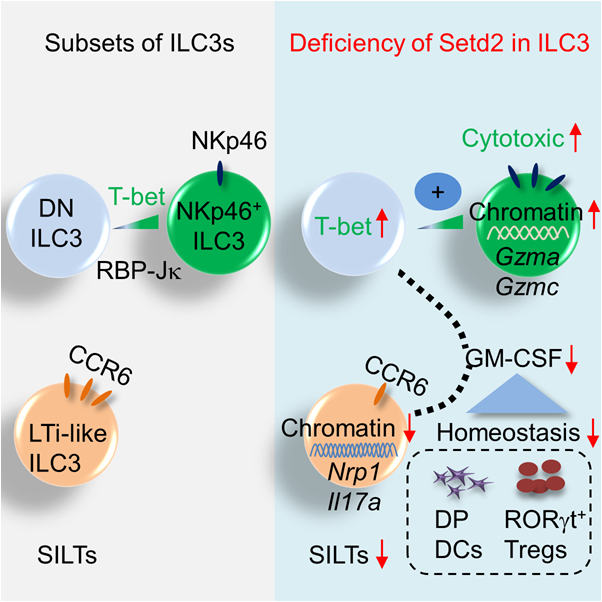Regulation of ILC3 by Setd2 Maintains Intestinal Immune Homeostasis
Setd2 (set-domain-containing 2) is a lysine (H3K36) methyltransferase that mediate H3K36me3 in mammalian cells. ILC3s (group 3 innate lymphoid cells) are a subset of innate immune cells abundantly located in the intestinal lamina propria. According to the surface expression of NKp46 and CCR6, ILC3 can be further divided into three subsets: NKp46+ILC3, DN (double negative) ILC3 and CCR6+ILC3. The three subsets of ILC3 have phenotypic and functional heterogeneity in transcription factor expression, cytokine secretion and spatial localization, and play crucial roles in intestinal infections, inflammatory diseases and tumors.
Although transcriptional regulation of ILC3 subsets differentiation has been reported, whether and how epigenetic mechanisms affecting histone and DNA modification involved in ILC3 differentiation and function remains unclear.
In this study, researchers found that Setd2 could maintain the homeostasis of intestinal ILC3 in mice and regulate the distribution and function of ILC3 subsets, thereby affecting RORγt+ Treg (regulatory T cell) and intestinal immune response.
Loss of Setd2 leads to a decreased abundance of total ILC3 cells, and an increase in the proportion of NKp46+ILC3 subset, together with high expression of cytotoxic molecules (mainly Granzyme A and Granzyme C), which inhibit the growth of melanoma in vivo. The characteristics of Setd2-deficient NKp46+ILC3 may shed light on tumor cell therapy.
On the other hand, the CCR6+ILC3 lacking Setd2 shows a decrease in cell number and function, and simultaneously accompanied by the defects of SILT (solitary intestinal lymphoid tissue) formation, together with decreased GM-CSF secretion by Setd2-deficient NKp46-ILC3, which leads to the decrease of CD11b+CD103+DC (dendritic cell). All defects of these features may lead to susceptible to intestinal inflammation associated with defective homeostasis of RORγt+Treg upon adaptive immune system reconstruction in mice. RORγt+Treg is enriched in the intestine and known to inhibit intestinal inflammation through various mechanisms. These findings uncover role of Setd2 in intestinal immune homeostasis maintaining. Researchers have further demonstrated that Setd2 regulates gene expression by affecting chromatin accessibility of ILC3 subsets by ATAC-seq.
This work explores and correlates the epigenetic and transcriptional mechanisms that regulate the differentiation and function of ILC3 subsets, and gives further understanding of intestinal immune homeostasis.
Entitled “Setd2 determines distinct properties of intestinal ILC3 subsets to regulate intestinal immunity”, this research was published online in Cell Reports on 15th March 2022.
The study was sponsored by the Ministry of Science and Technology of China, the National Natural Science Foundation of China, and the Science and Technology Commission of Shanghai Municipality. Dr. QIU Ju from Shanghai Institute of Nutrition and Health (SINH), Chinese Academy of Sciences (CAS), and Dr. LI Li from Shanghai Jiao Tong University are the corresponding authors of this article and Dr. CHANG Jiali from SINH is the first author. It was also supported and helped by Dr. HU Xiaoyu and Dr. GUO Xiaohuan from Tsinghua University, Dr. Juan Carlos Zúñiga-Pflücker from University of Toronto, Dr. QIN Jun from SINH, Dr. LIU Xing from Institute Pasteur of Shanghai, CAS, and other researchers.

Regulation of ILC3 and intestinal immunity by Setd2. (Image provided by Dr. QIU Ju’s group)
WANG Jin (Ms.)
Shanghai Institute of Nutrition and Health,
Chinese Academy of Sciences
Email: sibssc@sibs.ac.cn
Web: http://english.sinh.cas.cn/
